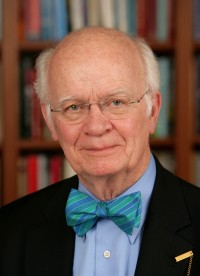Keep it to yourself: Is there an upside to gossip?
Like W. C. Fields and most Christians, I spend a good deal of time reading the Bible, looking for loopholes. Recently, I focused on getting off the hook with respect to the sin of gossip. I was moved to do this after reading two New York Times articles on the subject on the same day (August 16), and after listening to all levels of the church debate how seriously to take the Pauline (and deutero-Pauline) writings on homosexuality.
Trying to reach the level of sophistication in hermeneutics to which much of the debate aspires, I used my own method of comparison. In my New Testament, if one includes a general passage and two single-word references, Paul condemns homosexuality in passages that measure vertically 1.3 inches. He condemns gossip—again counting one general passage and two single-word references—in 1.4 inches of type. Given that standard, one can conclude that he considers gossip to be as reprehensible as homosexual activity. So we are not left with much of a loophole, and have to take gossip seriously.
Getting back to the New York Times: Roben Farzad had an article titled “To Market a Magazine, Fill It with Celebrity Gossip.” The circulation figures cited should stun our editors and staff, who welcome subscriptions but shun celebrity gossip. In one year, Touch increased sales by 49.7 percent and Us Weekly grew by 23.9 percent. “Consumers have an insatiable appetite for celebrity news,” the author concluded. Meanwhile, “newsweeklies continued their slump.” Playboy missed its advertising target while more celebrity-minded Maxim and Stuff won new readers.
More upbeat was Benedict Carey’s “Have You Heard? Gossip Turns Out to Serve a Purpose.” Gossip, we learn, helps clarify and enforce the rules that keep people working well together. It circulates crucial information that cannot be published in an office manual. It offers a foothold for newcomers and provides a safety net for those who risk falling out of the group. Gossip offers group protection, so “gossiping too little may be at least as risky as gossiping too much.” These conclusions are backed by scientific and social-scientific studies, Carey tell us.
On this page we monitor life in religious communities. Everything in Carey’s summary has some bearing on congregational life. Since congregations need clarification, rule enforcement, information spreading, initiation rites and social communication, they find themselves fostering and depending upon gossip to survive and thrive. They may not be able to depend upon celebrity gossip to increase interest in their church bulletins, but the other benefits are theirs.
I once heard of two pastors who were talking about their parishes. One griped that his members were always gossiping about one another. The other listened with awe and envy: he only wished the members of his congregation cared enough about each other to gossip.
But here is the downside: in Paul’s writings, to gossip is to sin. Gossip tends to be whispered, so it may not serve well as a response to Martin Luther’s blurted dictum, “Sin boldly.” Yet this constructive social activity, the Darwinians would say, is bred into our genes. Back to Paul and the letter to the Romans, where gossips, along with homosexuals, do “things that should not be done.” “They are gossips. . . . They know God’s decree, that those who practice such things deserve to die.”
“Have you heard the one about your fellow-member who keeps on gossiping?” “Did you know that our pastor regularly . . . ?” “I heard that our deacon won’t ask for forgiveness, even though he was heard gossiping?” “Pass it on, but don’t tell anyone.”





